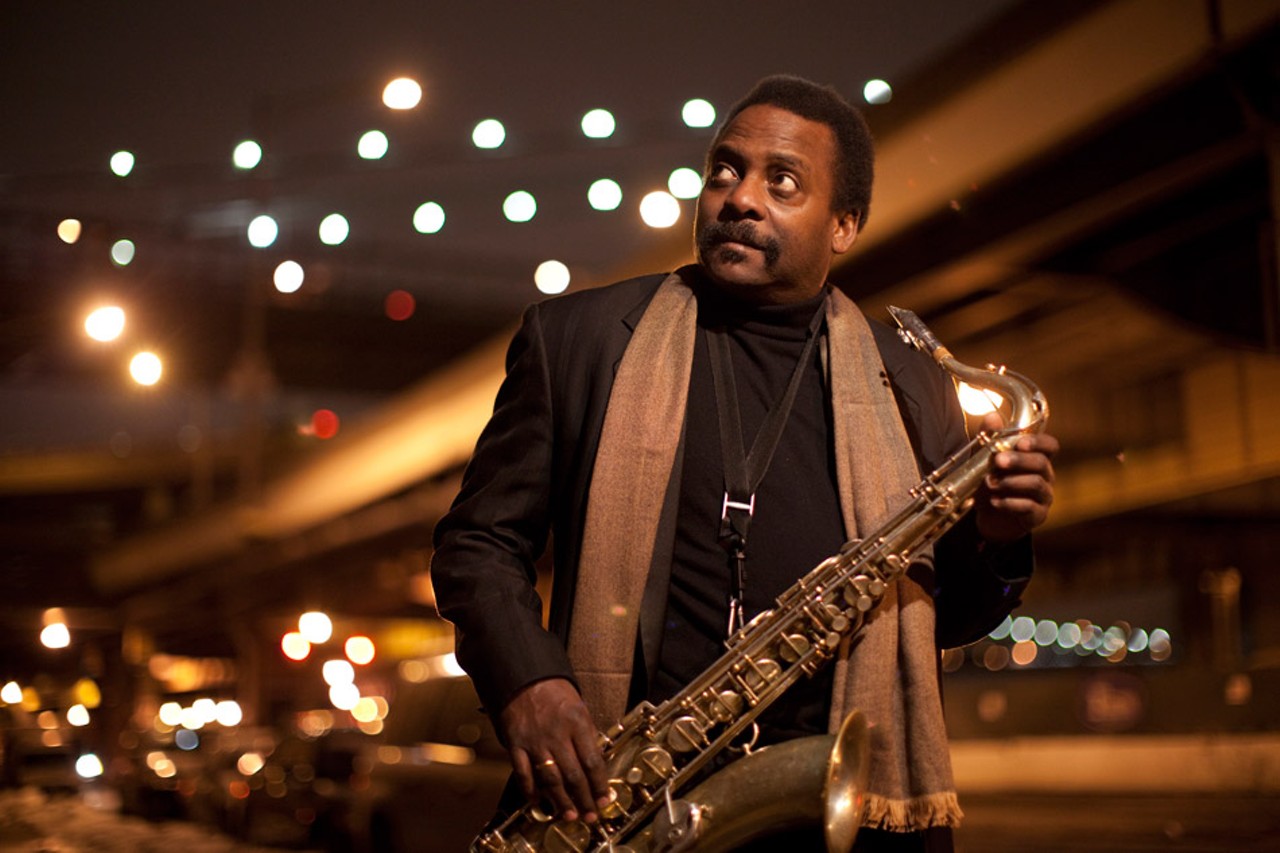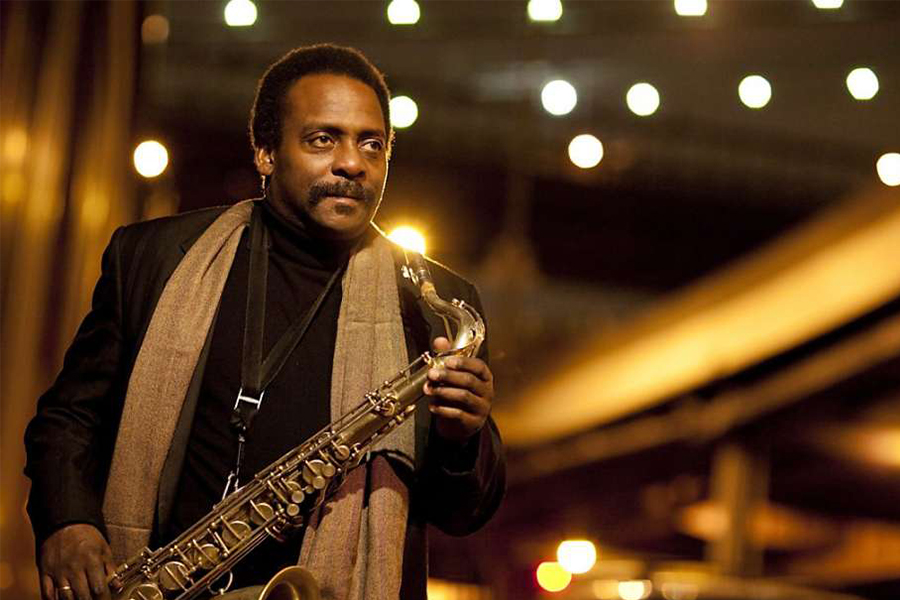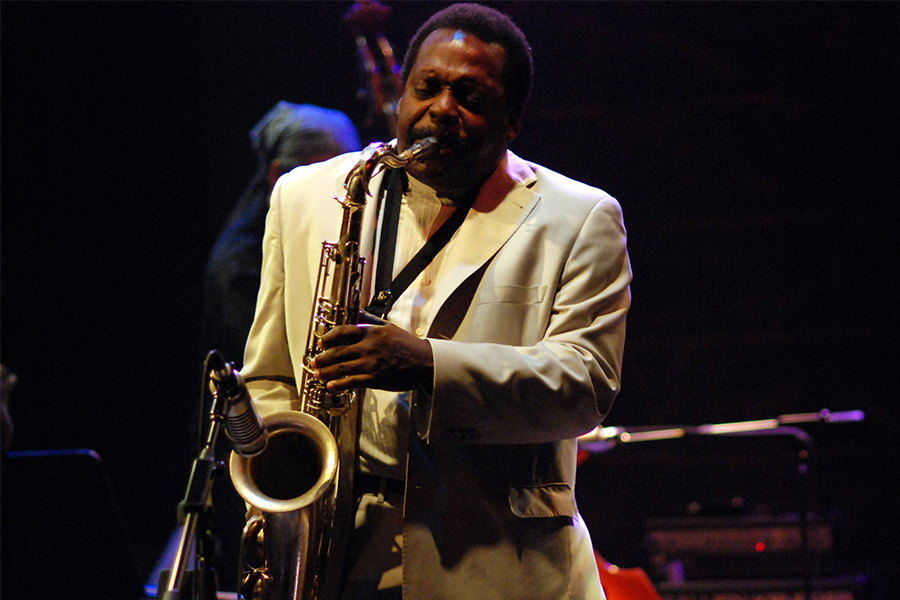
David Murray
Already at the beginning of his career Murray acquired a reputation as a potential musician. His musical personality was formed by jazz, blues and gospel. Born in Oakland, as a child Murray played music in church with his parents and brothers, and studied music with his mother, an organist. However, Murray’s ideals changed before long. He attended Pomona College, where he studied with trumpeter Bobby Bradford, a former sideman of Ornette Coleman. Around this time, he met the writer Stanley Crouch, who became his unofficial publicity agent.
After settling in New York in 1975, Murray followed in the footsteps of Albert Ayler and Archie Shepp, the harbingers of free jazz. He had a penchant for distorted timbres, extremes of volume, and forays into the horn’s uppermost reaches and untamed improvisations. He experimented in Studio Infinity, which he established together with Crouch.
New York served as a setting for new encounters: Sunny Murray, Oliver Lake, Anthony Braxton, Don Cherry, Lester Bowie and Frank Lowe among other jazz greats. Here he met and played with Cecil Taylor, who along with Dewey Redman, gave the young musician the encouragement he needed.
In 1976, Murray set up the “World Saxophone Quartet” with Oliver Lake, Hamiet Bluiett and Julius Hemphill. This marked the beginning of an intensely creative time with an endless permutation of formations – quartet, then octet, and finally quintet. From this time on he focused more on his own ensembles, although he also has worked with other musicians from Guadeloupean drums to South African dancers and musicians.
At the end of the ‘90s, Murray was frequently associated with fusion, world music and even pan-Africanism. At the time he also composed film soundtracks, worked with “Urban Bust Women” dance company and other theatre people, arranged compositions by Duke Ellington, Paul Gonsalves and Nat King Cole among other jazz icons.
Moreover, Murray composed two operas: The Blackamoor of Peter the Great for strings and voices (2004), based on selection of Pushkin poems, and The Sysiphus Revue, a bop opera for gospel choir (2008).
In 2006, the saxophonist revived “Black Saint Quartet” as a tribute to the legendary Italian label Black Saint, which released 17 of his albums recorded together with “World Saxophone Quartet”, Randy Weston, Dave Burell, Lawrence “Butch” Morris, Olu Dara, Anthony Davis, Craig Harris, John Hicks, James “Blood” Ulmer, Don Pullen, Steve Coleman to name but a few. It was one his most successful creative periods.
In recent years, Murray has been focusing on projects with vocalists. The soul music star Macy Gray, one of his Muses, has enhanced a number of Murray’s albums. Together with his big band she has conquered audiences in festivals such as Jazz A La Villette (Paris), London Jazz Festival, North Sea Jazz Festival (the Netherlands), and more.
His “Infinity Quartet” debut album features Gregory Porter, and the second one – Saul Williams, a spoken word artist. Perfection, featuring pianist Geri Allen and drummer Terri Lyne Carrington, marked a new milestone in Murray’s discography.
Several directors have brought his musical career to the screen: Speaking in Tongues, a saga, which follows him for ten years from 1978 to 1988, as well as Jazzman (1997), and Saxophone Man (produced by Arte in 2007). The musician’s awards include a Grammy, the Bird Award, the Danish Jazzpar Prize, Ralph J. Simon Rex Award, Village Voice musician of the ‘80s. In addition, Pomona College endowed him with the title of the Honorary Doctor.
Projects
David Murray Octet Revival
Saxophonist David Murray is one of the most prolific and adventuresome figures in modern jazz. His innovative Octet, perhaps the best vehicle for his formidable composing and arranging skills, released eight recordings on a steady basis between 1980 and 2000. Now he is re-introducing a reinvigorated version of this iconic group in a series of performances.
“Growing up in a religious, musical family in Berkeley, CA, I would at times find myself in the middle of an old-fashioned ‘Revival” tent, not far from my home. All denominations were welcome to this spectacular event held in this tent, which featured traveling preachers, healers, and speakers and lots of worshippers seeking spiritual rejuvenation. This phenomenon originated in the American South and made it all the way to my neighborhood. The purpose was to unearth or bring back people’s belief in God, to be reinvigorated with the holy spirit of The Lord. My Octet of the ‘70s, ‘80s and ‘90s were quite popular then. My wish for a “Revival” of this Octet with a new and fresh line-up seems to the direction in which the music is taking me, as a way to inspire others and motivate a new crew of creative musicians.” – David Murray
David Murray Quartet
David Murray (ts, cl.b.) / Hamid Drake (drums) / Luke Stewart (bass) / Lafayette Gilchrist (piano)
David Murray / Hamid Drake Duet





